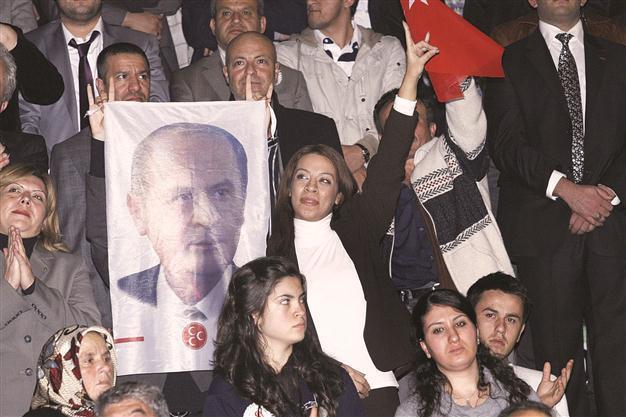Three parties, three conventions
ANKARA - Hürriyet Daily News

Hürriyet photo
Political parties had a rough year in 2011. They went through a wearisome general election, as well as internal strife and other grueling matters.While the main opposition People’s Republican Party (CHP) is still going through the turmoil of leadership change, the Nationalist Movement Party (MHP) managed to maintain its present leader despite the tape scandals, but had limited success in forming new cadres. The Peace and Democracy Party (BDP), on the other hand, had difficulty in defining a policy due to the isolation of Abdullah Öcalan, the imprisoned leader of the outlawed Kurdistan Workers’ Union (PKK), suspension of the Kurdish Initiative and arrests of their party officials within the scope of the Kurdistan Communities Union (KCK) trials.
We are entering a new year. 2012 is set to be a very interesting year for all the three parties, as we are going to witness their historic conventions. The Justice and Development Party (AKP), the CHP and the MHP have selected the fall of 2012 to stage their conventions. These conventions bear “historic” significance for all the three parties. PM Erdoğan is going to shape his party’s cadres for 2020; the neo-nationalist opposition is going to test its strength in the CHP; while a novel candidate may run up against the MHP’s strong leader Devlet Bahçeli for the first time.
We can summarize the possible developments awaiting the three parties in 2012 as follows:
AKP: Erdoğan will run for the last time in the fall’s grand congress, in accordance with the three-term rule in the party’s charter. The congress will indeed be a historic one, as Erdoğan will yield clues regarding future plans about his possible accession to presidency. The party profile he will present in the congress is going to reflect whether he has any inclinations to go up to the Çankaya Presidential Palace.
Erdoğan will also be designing the new AKP that will succeed him. Since many well-known figures will not be able to run due to the three-term rule, the new faces he will be presenting are also going to have a decisive impact on his 2020 vision. This congress will thus allow for a peek into what lies at the back of Erdoğan’s mind.
MHP: Bahçeli may encounter a rival in the fall convention for the first time. Even though he seems to be the strongest candidate for leadership, the party’s internal restlessness is no secret. Mansur Yavaş had made a notable dash but failed to exert much influence.
Koray Aydın, on the other hand, is gaining in strength at grassroots level. A group fed up with Bahçeli’s consistent but routine understanding of opposition could run against him with Koray Aydın. Although he has not made any definitive decision on this matter, Aydın is known to be working his way through the party’s grassroots.
BDP: They are rolling up their sleeves for another convention in 2012. Their principal aim is the grand Kurdish convention to be staged in January or February and which came up during talks held with Barzani several months ago.
The BDP’s chief goals are to end Öcalan’s isolation, the new constitution and amendments to broaden freedom in such laws as the Turkish Penal Code and the Anti-Terror Law, often described as cleaning up the road. Measures which may be enacted in relation to a possible lawsuit to shut the party down are also among their top concerns.
The Nationalist Movement Party held its last convention in November 2009 and Bahçeli was re-elected to the post.
FREEDOM FOR THE HEADSCARF TO FOLLOW NEXT?
The ruling AKP, which ran into some hardship as a consequence of the opposition’s moves to hamper Parliament’s internal regulations, took the initiative to amend internal regulations on the last day of 2011. An amendment proposal issued by five deputy leaders of the AKP mainly highlighted the stumbling blocks created by the opposition. An amendment had earlier been proposed to allow women to wear pants in Parliament, but was then set aside due to a motion presented by the Peace and Democracy Party (BDP) to liberalize the headscarf. As this proposal is debated in the backrooms, it is said this will definitely come about through a motion or another amendment to the internal regulations in 2012.
SPEAKER’S OUTCRY AGAINST UNIVERSITIES ON CHARTER WORKS
Political parties, nongovernmental organizations and minority foundations have shown plenty of interest in Parliament’s Constitutional Conciliation Commission . Representatives of various organizations are transmitting their views to Parliament either face to face or in writing. Except one institution: Universities! Only the Turgut Özal University has expressed its views despite repeated calls by Parliamentary Speaker Cemil Çiçek. “We keep shouting and yelling, but universities continue to maintain their silence. How could universities maintain such silence when the most fundamental law is on the line?” Çiçek has said. It remains to be seen, however, whether universities decide to show greater interest in the commission, which will continue taking views until April.











